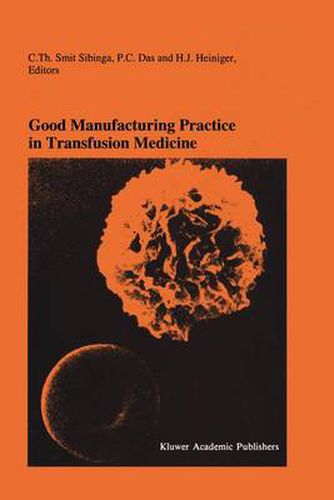Readings Newsletter
Become a Readings Member to make your shopping experience even easier.
Sign in or sign up for free!
You’re not far away from qualifying for FREE standard shipping within Australia
You’ve qualified for FREE standard shipping within Australia
The cart is loading…






This title is printed to order. This book may have been self-published. If so, we cannot guarantee the quality of the content. In the main most books will have gone through the editing process however some may not. We therefore suggest that you be aware of this before ordering this book. If in doubt check either the author or publisher’s details as we are unable to accept any returns unless they are faulty. Please contact us if you have any questions.
Transfusion medicine provides an excellent bridge connecting the healthy community donors with the patient’s needs at the bedside; the dominant philosophy has been on patient care and science, but it is now realised that blood banks manufacture increasing amounts of blood components to administer to patients - a role analogous to manufacturing functions. The concept of Good Manufacturing Practice (GMP) is therefore relatively new. While quality has always been important, the impact of GMP, Total Quality Management (TQM) and Quality Assurance (QA) will be profound. This publication addresses the various implications of the implementation of these concepts upon transfusion medicine. As the regulatory agencies, like the FDA in the U.S.A. and the EEC Commission in Europe, increase their enforcement activities, doctors, technical experts and managers will have to face many issues of quality assurance including documentation, validation, audit system, regulatory laws, licensing, teaching and training of staff and their job descriptions, standards, processing facilities, procedure validations, automation, record keeping, internal and external quality control of products and their release. The expansion of this philosophy to include Good Clinical Practice (GCP) is an even greater challenge demanding consensus therapy protocols and quality management of transfusion through auditing by the hospital transfusion committees. Such comprehensive plans will profoundly affect the financial and organizational structure of blood transfusion in the future.
$9.00 standard shipping within Australia
FREE standard shipping within Australia for orders over $100.00
Express & International shipping calculated at checkout
This title is printed to order. This book may have been self-published. If so, we cannot guarantee the quality of the content. In the main most books will have gone through the editing process however some may not. We therefore suggest that you be aware of this before ordering this book. If in doubt check either the author or publisher’s details as we are unable to accept any returns unless they are faulty. Please contact us if you have any questions.
Transfusion medicine provides an excellent bridge connecting the healthy community donors with the patient’s needs at the bedside; the dominant philosophy has been on patient care and science, but it is now realised that blood banks manufacture increasing amounts of blood components to administer to patients - a role analogous to manufacturing functions. The concept of Good Manufacturing Practice (GMP) is therefore relatively new. While quality has always been important, the impact of GMP, Total Quality Management (TQM) and Quality Assurance (QA) will be profound. This publication addresses the various implications of the implementation of these concepts upon transfusion medicine. As the regulatory agencies, like the FDA in the U.S.A. and the EEC Commission in Europe, increase their enforcement activities, doctors, technical experts and managers will have to face many issues of quality assurance including documentation, validation, audit system, regulatory laws, licensing, teaching and training of staff and their job descriptions, standards, processing facilities, procedure validations, automation, record keeping, internal and external quality control of products and their release. The expansion of this philosophy to include Good Clinical Practice (GCP) is an even greater challenge demanding consensus therapy protocols and quality management of transfusion through auditing by the hospital transfusion committees. Such comprehensive plans will profoundly affect the financial and organizational structure of blood transfusion in the future.